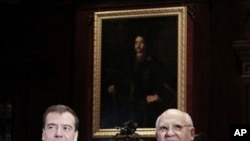Mikhail Gorbachev, the last leader of the Soviet Union, just celebrated his 80th birthday. Our correspondent looks at the dramatic changes he brought on domestically.
March 11, 1985, Mikhail Gorbachev was elected General Secretary of the Communist Party of the Soviet Union. At 54, he was the youngest member of the ruling Politburo that voted him into power. For the next six years, Mr. Gorbachev instituted policies that would dramatically change the course of history and ultimately lead to the demise of the Soviet Union.
On the domestic front, Mr. Gorbachev embarked on the policies known as “glasnost” and “perestroika.”
Archie Brown, Professor Emeritus at the University of Oxford (England), says both terms changed their meanings over time.
“'Glasnost' at first meant a greater openness, but gradually it developed into freedom of speech and publication," said Brown. "[Boris] Pasternak’s Doctor Zhivago was published in 1988. Amazingly, [Aleksandr] Solzhenitsyn’s Gulag Archipelago was published in 1989. So this was far beyond the ‘glasnost’ of 1985."
And as for “perestroika”:
“At first, it was a synonym for reform, or a euphemism for reform, because even the very word reform had been virtually taboo in the [Leonid] Brezhnev era," said Brown. "But again, gradually, it came to mean something much more than that. And by 1988, it began to mean politically transformative change.”
Brown says Mr. Gorbachev’s domestic policies during his six-year tenure broke with the Soviet past. They included the release of political prisoners and dissidents from jail or internal exile, including human rights activist Andrei Sakharov; the establishment of freedom of religious observation and an end to the persecution of churches; freedom of communication across borders, including an end to the jamming of foreign broadcasts; and allowing the development of civil society and progress toward the rule of law.
Brown says there was one key reform.
“Introducing contested elections for a legislature with real power," he said. "And that decision was taken in 1988, and it was implemented with the elections for the Congress of People’s Deputies of the U.S.S.R. in March 1989. I would say that marked the point at which liberalization of the system turned into democratization. It never became a fully fledged democracy, but nevertheless the process of democratization was really under way by then.”
Experts say one institution Mr. Gorbachev was unable to reform was the Soviet Communist Party. He did introduce more debate in party meetings and some transparency in its workings, but experts say he did not go far enough.
Robert Legvold is with Columbia University:
“He was very slow in, if you will, refurbishing leadership within the Communist Party," said Levgold. "And I think in the end that harmed him because he left a lot of - particularly at middle and slightly above levels of the party - traditional party apparatchiks [bureaucrats] who had no sympathy for the kind of changes he was trying to introduce.”
Some experts, including Archie Brown of Oxford University, say Gorbachev’s most notable failure as Soviet leader was economic reform.
“For the first five years, day-to-day responsibility for economic reform was in the hands of Nikolai Ryzhkov, the chairman of the Council of Ministers," he said. "And he was at most a technocratic reformer. And so Ryzhkov could see that eventually, there should be some kind of market economy, but he was very reluctant to take those steps. And Gorbachev himself didn’t push it, because he realized that the transition would be very difficult, as indeed it was in the 1990s.”
Eventually, says Brown, Mr. Gorbachev was persuaded that a market economy was essential. But it was too late.
Experts say Mr. Gorbachev unleashed forces that he eventually could not control - forces that led to the collapse of communism in Eastern Europe and ultimately to the demise of the Soviet Union on December 25, 1991, when Mikhail Gorbachev resigned as Soviet president.
Gorbachev's Domestic Reforms Broke With Soviet Past




